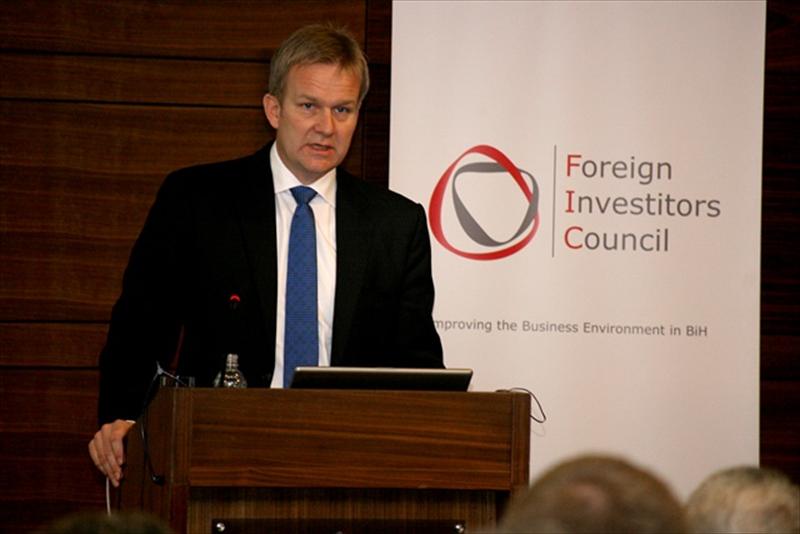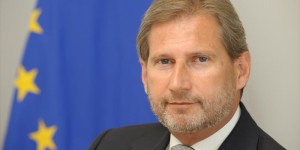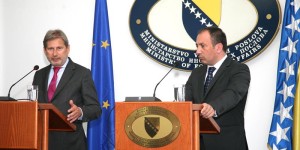Honored guests,
Ladies and gentleman,
Good morning
and thank you very much for allowing me in here with you to give a couple of comments on the initial investment in BiH through an EU prism.
Let me start by thanking the (Foreign Investors) Council for having this new edition of the White Book printed. We were here two years ago when the last one was printed. We are very happy to see the results of that but I will come back to that in a moment but this year around we are particularly happy with it because as you have probably seen the emphasis of the work that we are doing is more and more going to an economic field. I will come back to that also later in my speech.
We all know it. The economy of Bosnia and Herzegovina is challenged. Just glancing through the publication like the World Bank Doing Business Report, the World Economic Forum`s Global Competitiveness Report is enough to realize that this country continues to lag behind its neighbors perhaps not so much in terms of economic performance but certainly to the extent in which it moves towards reform and structural adjustment.
This is of course a matter of great significance and concern for the European Union. As well known we use the so-called Copenhagen Criteria as a guiding principle when assessing the degree of preparedness of a country aiming at joining our Union. The economic part of these criteria defines two main objectives for a potential member state:
1. That a country has a functioning market economy; and for Bosnia I`ll see one market economy
2. That it has the capacity to cope with competitive pressure and market forces within our Union
This means fundamentally that an economy needs to liberalize and reform itself to enhance its competitiveness and that is the real challenge that we face with in Bosnia and Herzegovina.
The assessment of progress in this domain starts very early on for a country that wants to become a member of European Union. Each candidate and potential candidate country reforms efforts are carefully monitored by the European Commission whose analysis is further endorsed by our member states. I imagine that you are all familiar with our fixed rendezvous the so-called Progress Report.
But probably less known is that Bosnia and Herzegovina as well as all other countries in the enlargement area needs to produce every year an economic report that is so-called Medium term economic and fiscal program that highlights the main principles and medium term economic policy. This report is also assessed by the Commission`s services.
But as you should have probably seen the Enlargement Strategy which was published last month, along with the annual Progress Report, makes reference to a new tool for candidate and potential candidate countries namely a `National Structural Reforms and Competitiveness Program`.
The aim of this document which will be used as a part of the regular consultations between EU and Bosnia and Herzegovina is to gradually submit this country to stricter procedures of economic and fiscal surveillance.
But let me turn for a moment to the Progress Report of 2013. As customary, the document takes stock of the progress made in Bosnia and Herzegovina on the path towards EU over the last year.
Unfortunately, this year`s Progress Report noted that Bosnia and Herzegovina has made little progress when it comes to the economic criteria.
There are three main reasons for that mentioned in Report: the first is inefficient legal and judicial system, the second is limited access to financing and as well as the political instability.
The Progress Report indicates that in order to move forward, Bosnia and Herzegovina needs to address a number of issues, and do the absolute know for a speech you are not allowed to mention more than three things but I have to mention seven:
– Bosnia and Herzegovina`s authorities needs to be supportive towards private sector business environment, most notably by improving contract enforcement procedures and by establishing a single, a single economic space;
– Also, a comprehensive reform of the labor market is needed to provide both flexibility for the employers as well for the employees and to give to employees minimum level of security
– Bosnia and Herzegovina for third point needs to liberalize network industries, most notably in the areas of energy, telecommunication, transport and water supply;
– Forth, it needs to address the issue of State Aid, which still remains high, with the state continuing to influence the economy throughout the numerous state-owned monopolies and EU sees a state for a state becasuse that what we do for all countries but don`t sit there in the entities and think it doesn`t count for the entities because it does
– It must reduce the large government sector, which currently spends money inefficiently and interferes with the economy by crowding out resources from the private sector;
– In needs to reinvigorate the privatization agenda, which has the potential to reduce waste, bring in much needed income for governments, more importantly, it will result in both lower prices for consumers and new opportunities for investors;
– And finally, Bosnia and Herzegovina must make a dedicated effort towards tackling corruption at all levels of public administration. And these are the points that were mentioned in this year`s report.
The result of not doing these, we believe, are that Bosnia and Herzegovina continues to lag behind the region as such when it comes to make the country attractive to investors and entrepreneurs. This is what I gained from talking to a number of you when I meet you out in the country when I visited your companies and this what we get back in our feedback when we are doing our consultation, broader consultations with NGO societies in this context.
It is not an easy set of tasks, we know that. But yet, as in the past, Bosnia and Herzegovina has the support of the European Union which stands ready to support through dialogue and assistance, including through our Instrument for Pre-Accession Funds.
The EU Delegation was present, as I said, two years ago when the last edition of the White Book was presented, and we have seen how the Foreign Investors Council has been able to influence the setting of the economic-policy agenda with the specific input from this White Book.
I am also very encouraged to see that many of the topics in the White Book that are being presented address concerns raised in the Progress Report.
We appreciate that this contribution is input from people and organizations with hands-on and detailed experience in the investment and business environment in Bosnia and Herzegovina. The experience has been analyzed and turned into specific recommendations that can feed into the public debate on improving the business governance of this country. This is civil society participation of high caliber we have to say which I would like to see echoed in many other sectors in Bosnia and Herzegovina and I can guarantee you that your white paper is not written in vein because we read it very carefully and we will read this one very carefully as well.
Today`s presentation of the new edition of the Foreign Investors Council`s White Book we believe is a step towards bringing back the Economy with capital E into the political discourse of this country.
I expect it will be recognized by governments and parliaments at all levels, and look forward to follow and support in months to come the debate on economic governance, economic policy and structural transformation which has been conspicuously absent until now in this country.
Thank you very much for your attention.




